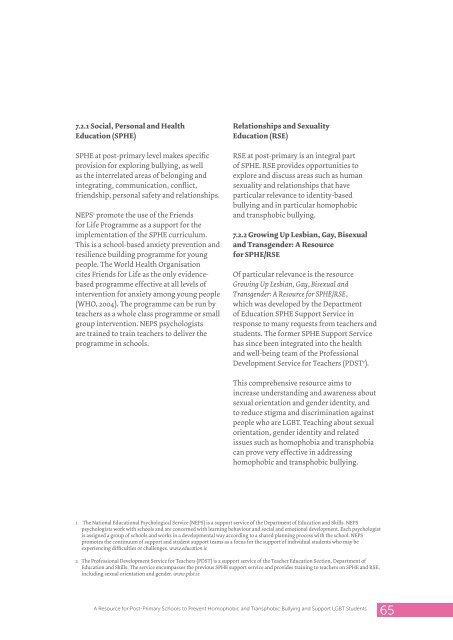‘BEING LGBT IN SCHOOL’
GLEN__Being_LGBT_in_School_10_Feb_2016_Web_3
GLEN__Being_LGBT_in_School_10_Feb_2016_Web_3
You also want an ePaper? Increase the reach of your titles
YUMPU automatically turns print PDFs into web optimized ePapers that Google loves.
7.2.1 Social, Personal and Health<br />
Education (SPHE)<br />
SPHE at post-primary level makes specific<br />
provision for exploring bullying, as well<br />
as the interrelated areas of belonging and<br />
integrating, communication, conflict,<br />
friendship, personal safety and relationships.<br />
NEPS 1 promote the use of the Friends<br />
for Life Programme as a support for the<br />
implementation of the SPHE curriculum.<br />
This is a school-based anxiety prevention and<br />
resilience building programme for young<br />
people. The World Health Organisation<br />
cites Friends for Life as the only evidencebased<br />
programme effective at all levels of<br />
intervention for anxiety among young people<br />
(WHO, 2004). The programme can be run by<br />
teachers as a whole class programme or small<br />
group intervention. NEPS psychologists<br />
are trained to train teachers to deliver the<br />
programme in schools.<br />
Relationships and Sexuality<br />
Education (RSE)<br />
RSE at post-primary is an integral part<br />
of SPHE. RSE provides opportunities to<br />
explore and discuss areas such as human<br />
sexuality and relationships that have<br />
particular relevance to identity-based<br />
bullying and in particular homophobic<br />
and transphobic bullying.<br />
7.2.2 Growing Up Lesbian, Gay, Bisexual<br />
and Transgender: A Resource<br />
for SPHE/RSE<br />
Of particular relevance is the resource<br />
Growing Up Lesbian, Gay, Bisexual and<br />
Transgender: A Resource for SPHE/RSE,<br />
which was developed by the Department<br />
of Education SPHE Support Service in<br />
response to many requests from teachers and<br />
students. The former SPHE Support Service<br />
has since been integrated into the health<br />
and well-being team of the Professional<br />
Development Service for Teachers (PDST 2 ).<br />
This comprehensive resource aims to<br />
increase understanding and awareness about<br />
sexual orientation and gender identity, and<br />
to reduce stigma and discrimination against<br />
people who are <strong>LGBT</strong>. Teaching about sexual<br />
orientation, gender identity and related<br />
issues such as homophobia and transphobia<br />
can prove very effective in addressing<br />
homophobic and transphobic bullying.<br />
1 The National Educational Psychological Service (NEPS) is a support service of the Department of Education and Skills. NEPS<br />
psychologists work with schools and are concerned with learning behaviour and social and emotional development. Each psychologist<br />
is assigned a group of schools and works in a developmental way according to a shared planning process with the school. NEPS<br />
promotes the continuum of support and student support teams as a focus for the support of individual students who may be<br />
experiencing difficulties or challenges. www.education.ie<br />
2 The Professional Development Service for Teachers (PDST) is a support service of the Teacher Education Section, Department of<br />
Education and Skills. The service encompasses the previous SPHE support service and provides training to teachers on SPHE and RSE,<br />
including sexual orientation and gender. www.pdst.ie<br />
A Resource for Post-Primary Schools to Prevent Homophobic and Transphobic Bullying and Support <strong>LGBT</strong> Students<br />
65


